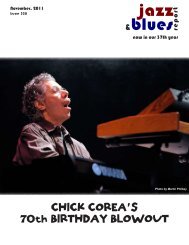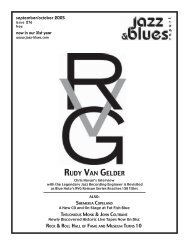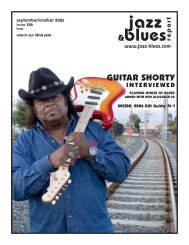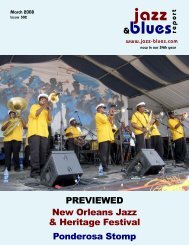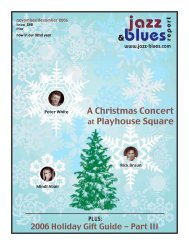&blues - the Jazz & Blues Report
&blues - the Jazz & Blues Report
&blues - the Jazz & Blues Report
- TAGS
- jazz
- blues
- jazz-blues.com
Create successful ePaper yourself
Turn your PDF publications into a flip-book with our unique Google optimized e-Paper software.
original into a rocking jump <strong>blues</strong> with plenty of boogie<br />
woogie <strong>blues</strong>. “Let Me Ride In Your Automobile,” which<br />
dates back to at least 1940 and Big Bill Broonzy. Taylor’s<br />
performance derives from Lowell Fulson’s recording, and<br />
Fulson receives <strong>the</strong> composer credit, and has a fine vocal<br />
that effectively highlights <strong>the</strong> wit of <strong>the</strong> double-entendre<br />
lyrics. “Flying With Whitey” is an instrumental that closes<br />
this recording on a hot jitterbugging note.<br />
Taylor’s originals are solid and idiomatic, his vocals are<br />
unforced and <strong>the</strong> Jet Setters know <strong>the</strong> difference between<br />
rock and roll and hard rock. I have enjoyed Taylor’s work<br />
when I have seen him play, so I am not surprised he has<br />
put out such a strong a strong <strong>blues</strong> and roots rock album.<br />
I bought it from bluebeatmusic.com, although it is available<br />
from amazon and cdbaby, so it should be relatively easy<br />
to find. Ron Weinstock<br />
AnGeLo DeBArre<br />
AnD LUDoVic Beier<br />
Swing rencontre<br />
Le cHAnT DU monDe<br />
I was introduced to <strong>the</strong> jazz accordionist (and accordina<br />
player) Ludovic Beier when he performed at<br />
<strong>the</strong> Kennedy Center as part of <strong>the</strong> Django Reinhardt<br />
Festival All Stars with Dorado Schmitt and o<strong>the</strong>rs. This<br />
concert of “Gypsy <strong>Jazz</strong>” preceded <strong>the</strong> actual Festival<br />
run at New York’s Birdland and was among <strong>the</strong> best<br />
musical performances I have been fortunate enough to<br />
see in some time. The mix of <strong>the</strong>ir astonishing virtuosity,<br />
wonderful group interplay and melodically based<br />
improvisation was exhilarating to listen to.<br />
Subsequent to <strong>the</strong> concert I purchased several<br />
recordings by participants and o<strong>the</strong>rs in this musical<br />
tradition that takes its inspiration from <strong>the</strong> legendary<br />
Django Reinhardt and <strong>the</strong> Quintette du Hot Club de<br />
France. One such album was by guitarist Angelo Debarre<br />
and Beier, “Swing Rencontre” on Le Chant Du<br />
Monde. DeBarre is one of <strong>the</strong> leading guitarists in this<br />
style today and <strong>the</strong>se recordings (originally recorded in<br />
2001) have <strong>the</strong> two backed by rhythm guitarist Michel<br />
Delacroix and bassist Antonio Licusati. A drummer is<br />
added on two selections, and on one number Jean-Paul<br />
Jamot replaces Licusati.<br />
This recording is comprised of interpretations of a<br />
few standards, several classic Django Reinhardt compositions,<br />
and some recent contributions from Debarre,<br />
Beier and Dorado Schmitt. Beier, on accordion, plays<br />
Pa g e ei g h T e e n<br />
May • June 2012 • Issue 342<br />
a musical counterpoint to Debarre’s guitar, similar to<br />
Stéphane Grappelli’s violin to Reinhardt. The accordion<br />
has had a prominent place in <strong>the</strong> French musette tradition<br />
as well as in gypsy jazz and Beier brings a rich<br />
approach to complement Debarre’s dazzling fretwork,<br />
while Delacroix and Licusati lay a swinging backing.<br />
After playing a couple bars of “There Will Never Be<br />
Ano<strong>the</strong>r You” at a dreamy tempo, Debarre kicks up <strong>the</strong><br />
tempo a couple of notches as he states <strong>the</strong> <strong>the</strong>me and<br />
launches his improvisation followed by an equally dazzling<br />
accordion solo. The dazzling, and crisp technique<br />
is matched with marvelous melodic improvisation and<br />
it’s a delight to hear <strong>the</strong>m trade fours. Though instrumental,<br />
<strong>the</strong> music <strong>the</strong>y produce sings and soars. Several<br />
of <strong>the</strong> selections are amongst <strong>the</strong> most famous of<br />
Reinhardt’s repertoire including “Swing 42,” “Dinette,”<br />
“Minor Swing” and <strong>the</strong> lovely “Nuages.”<br />
“Minor Swing,” originally from Reinhardt and Grappelli,<br />
is a high-spirited romp and <strong>the</strong>y certainly do<br />
justice to it. Most of <strong>the</strong> arrangements were contributed<br />
by <strong>the</strong> pair, but bassist Licusati provides <strong>the</strong> dramatic<br />
overtones to <strong>the</strong> rendition of “El Maintenant,” which<br />
is known in English speaking parts of <strong>the</strong> world as<br />
“What Now, My Love.” Beier penned “Paris Plage,” a<br />
lively duo with Debarre that opens with driving accordion<br />
and Debarre comping behind him before <strong>the</strong> two<br />
switch roles with Beier providing an organ-like texture<br />
under <strong>the</strong> guitar. Debarre’s “Have You Something?” is<br />
a lovely ballad, and Beier and bassist Jean-Paul Jamot<br />
contributed <strong>the</strong> lively original “Michel Got rhythm,”<br />
dedicated to rhythm guitarist Delacroix.<br />
This is a recording that should be readily accessible<br />
with its strong melodic foundation, swing rhythms and<br />
driving inspired improvisations. The music on “Swing<br />
Rencontre” is exciting and brilliant. Ron Weinstock<br />
TAiL DrAGGer & BoB corriTore<br />
Longtime friends in <strong>the</strong> <strong>Blues</strong><br />
DeLTA GrooVe<br />
Chicago <strong>blues</strong> performer Tail Dragger has a new<br />
release in collaboration with Bob Corritore on Delta<br />
Groove, “Longtime Friends In The <strong>Blues</strong>.” Tail Dragger<br />
has built a career on his Howlin’ Wolf inspired style<br />
while Corritore is not only a fine harmonica player, but<br />
also a terrific producer of classic Chicago styled <strong>blues</strong><br />
recordings. Corritore and Tail Dragger met <strong>the</strong> day after



